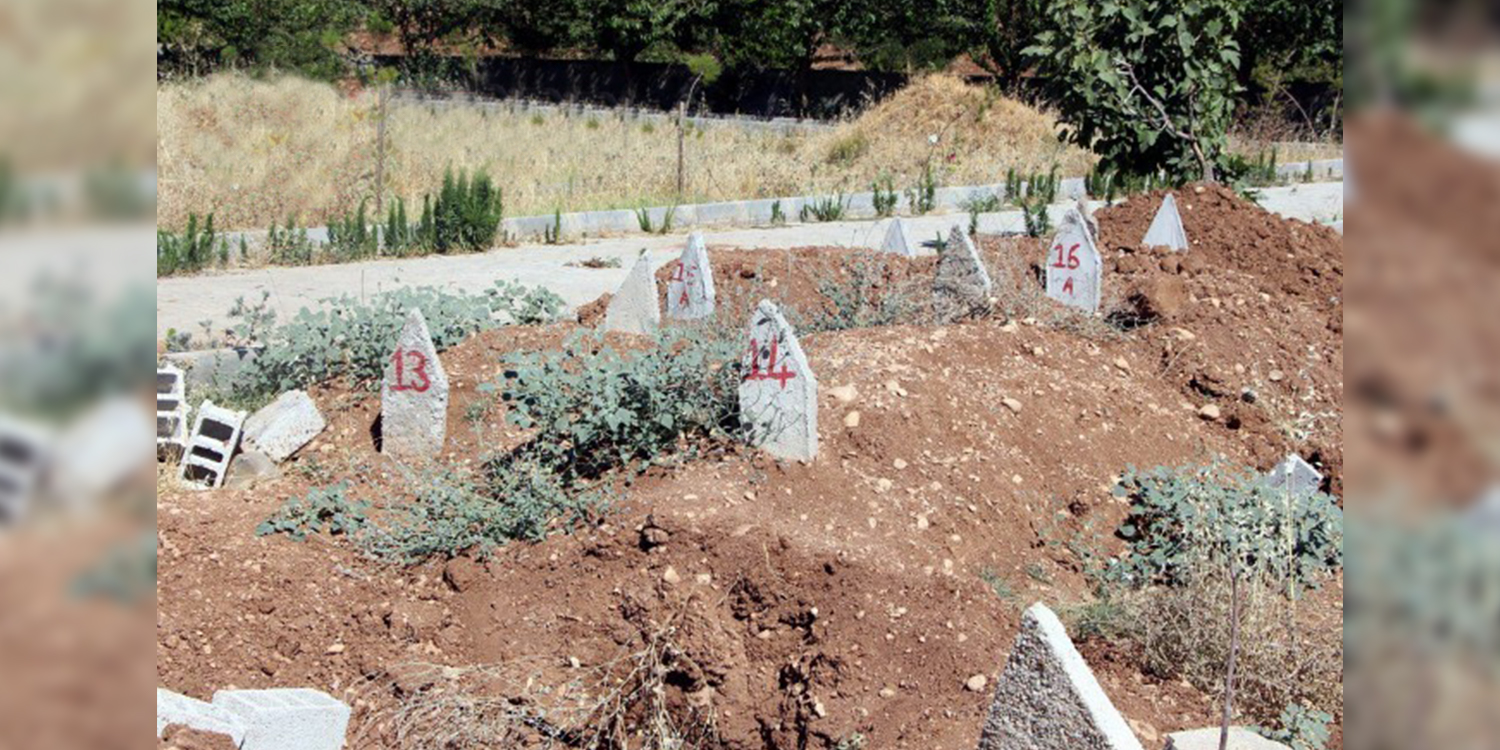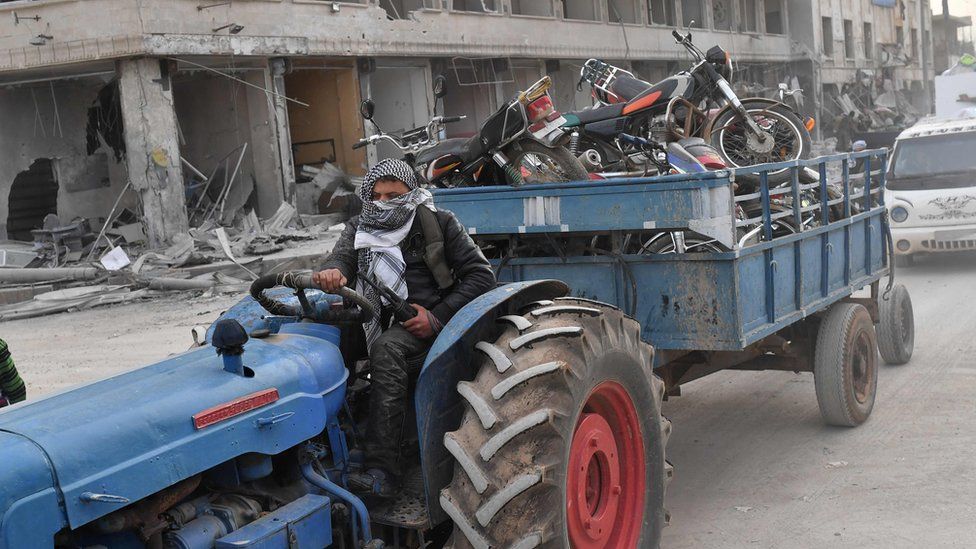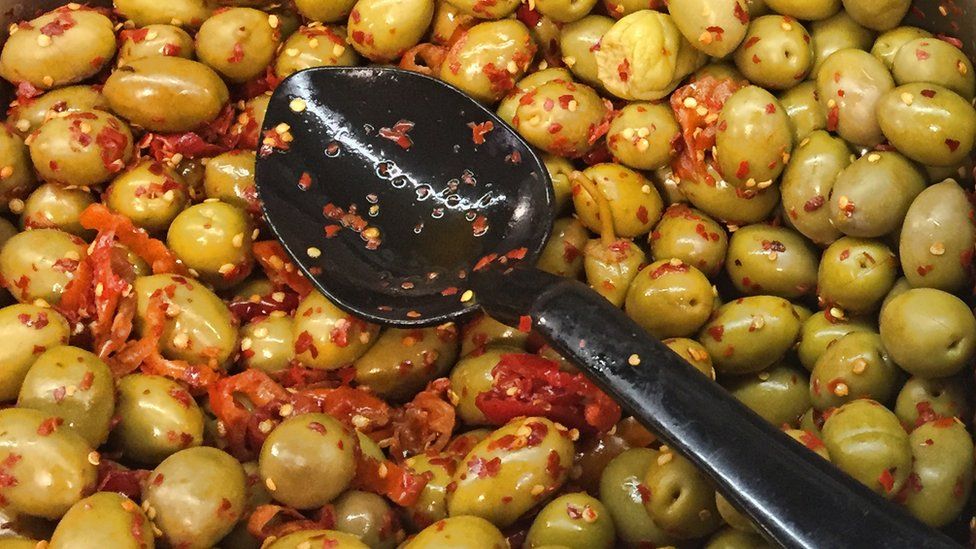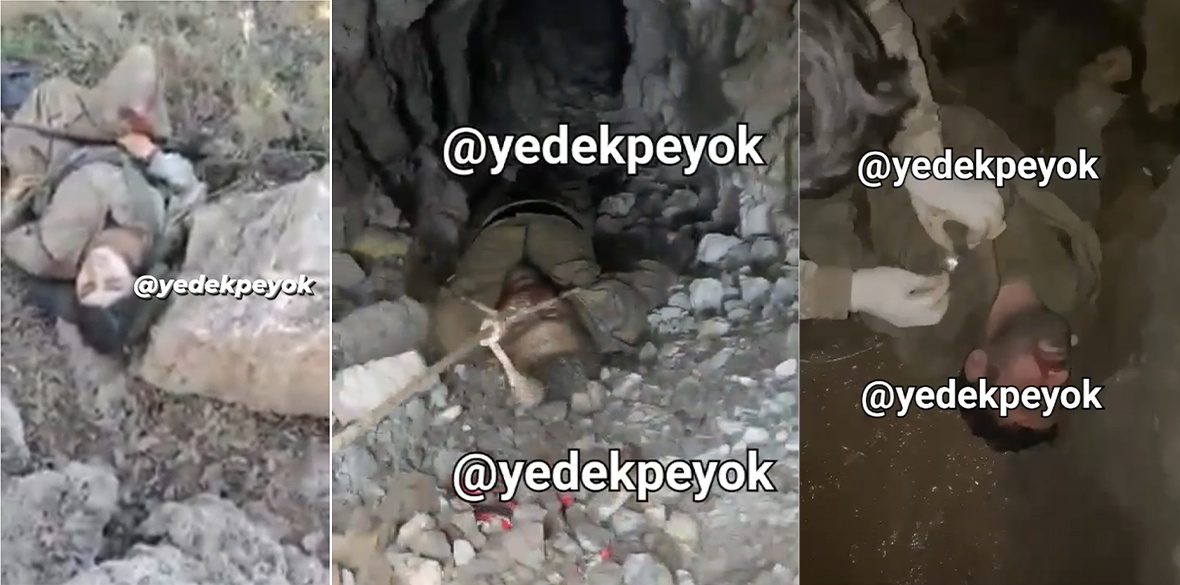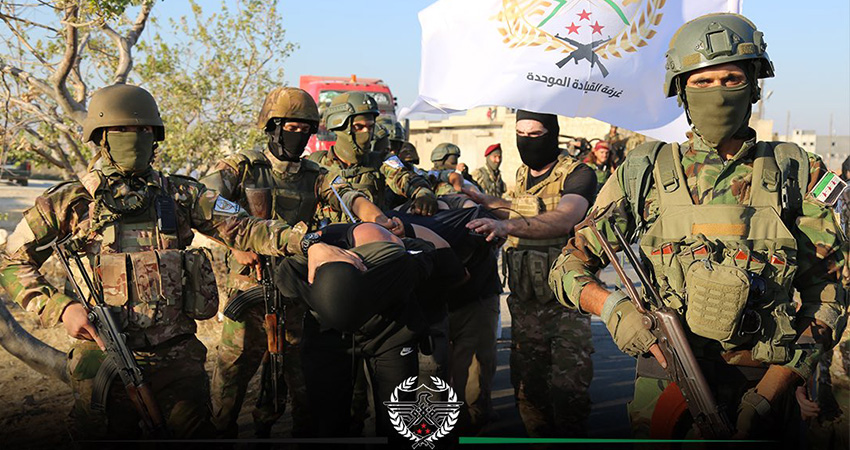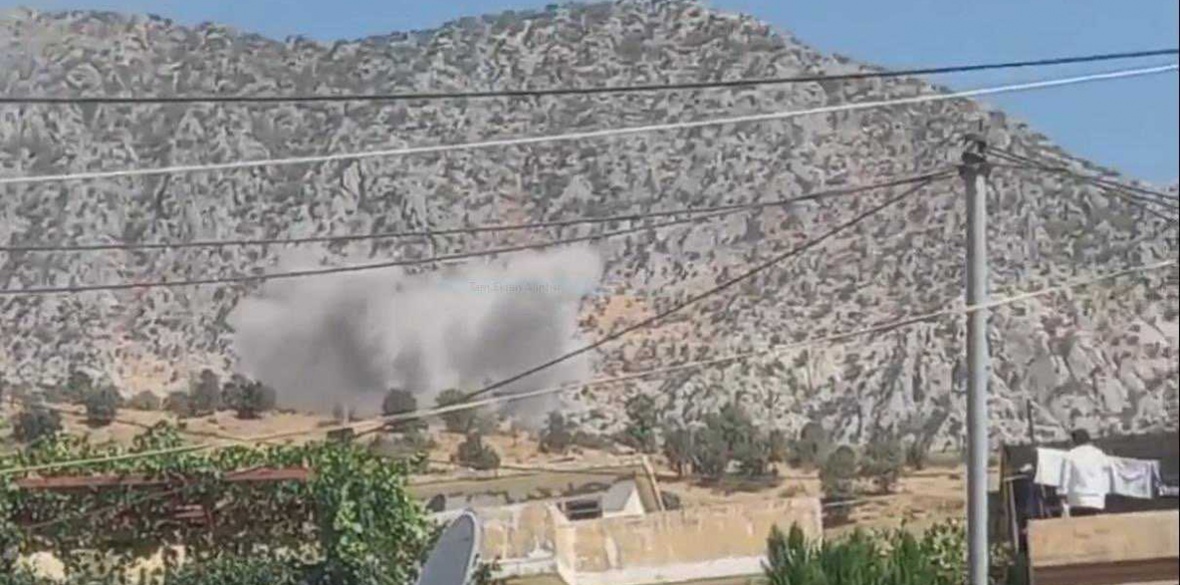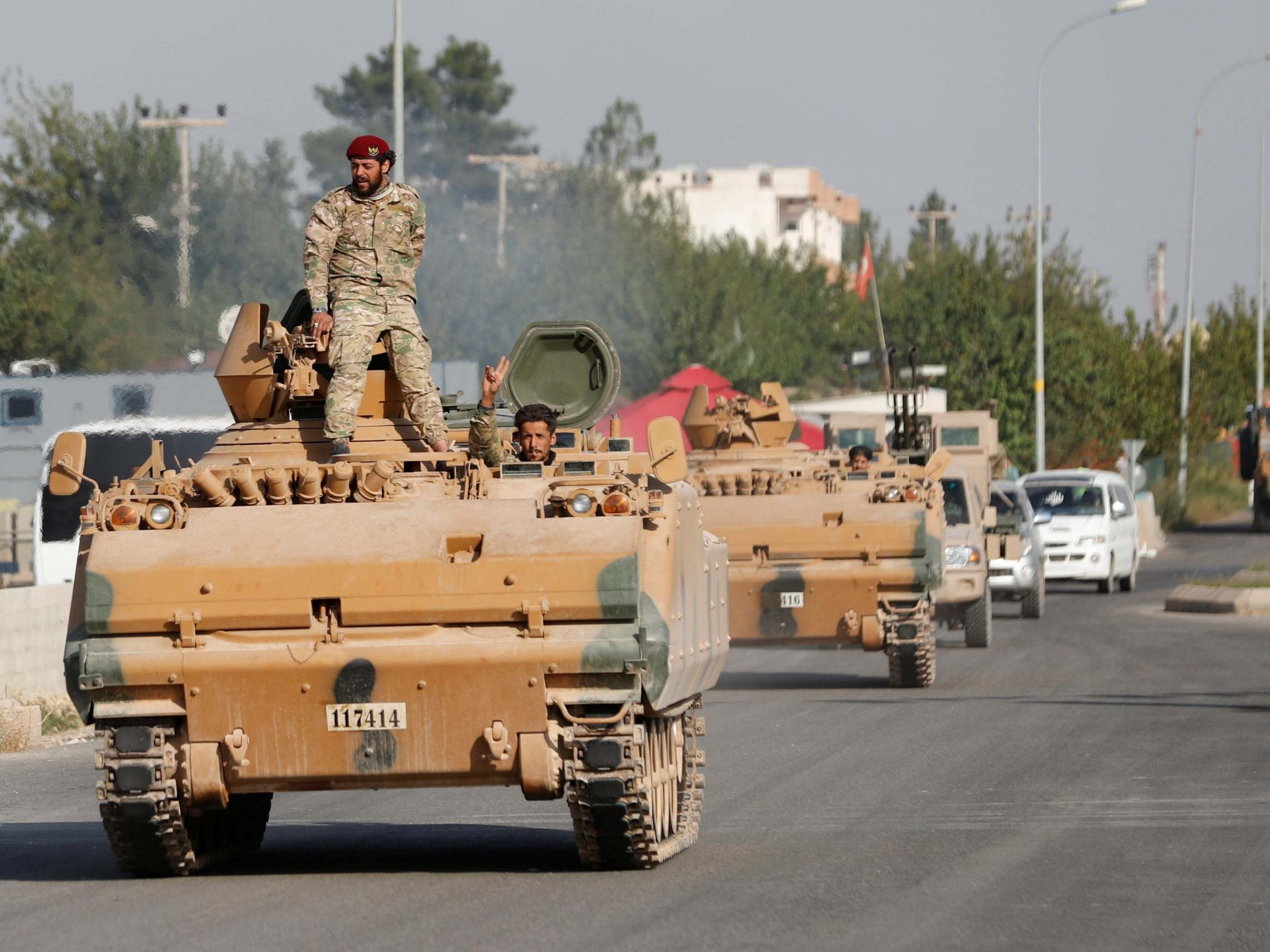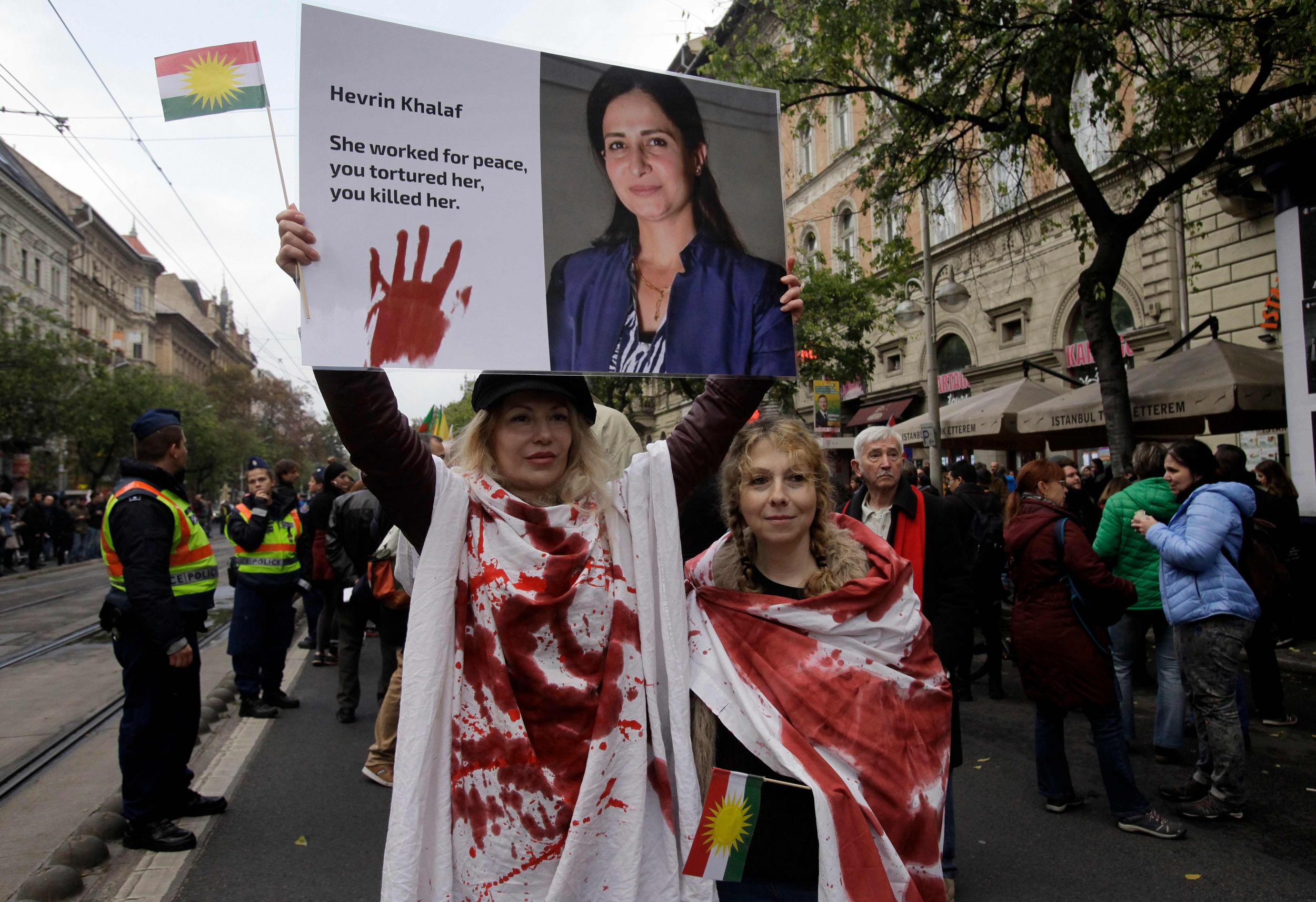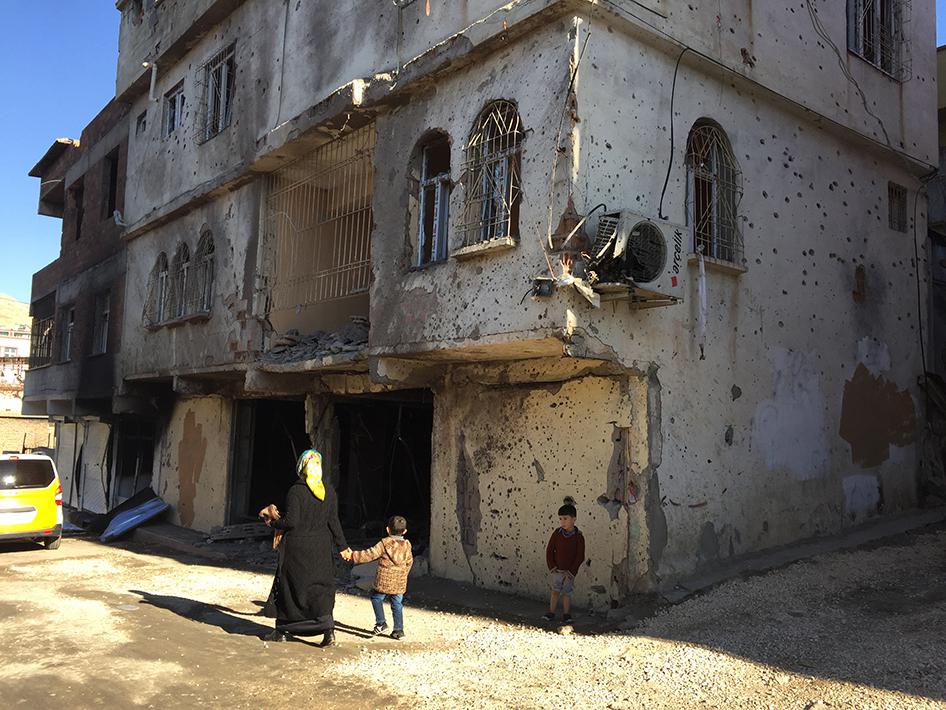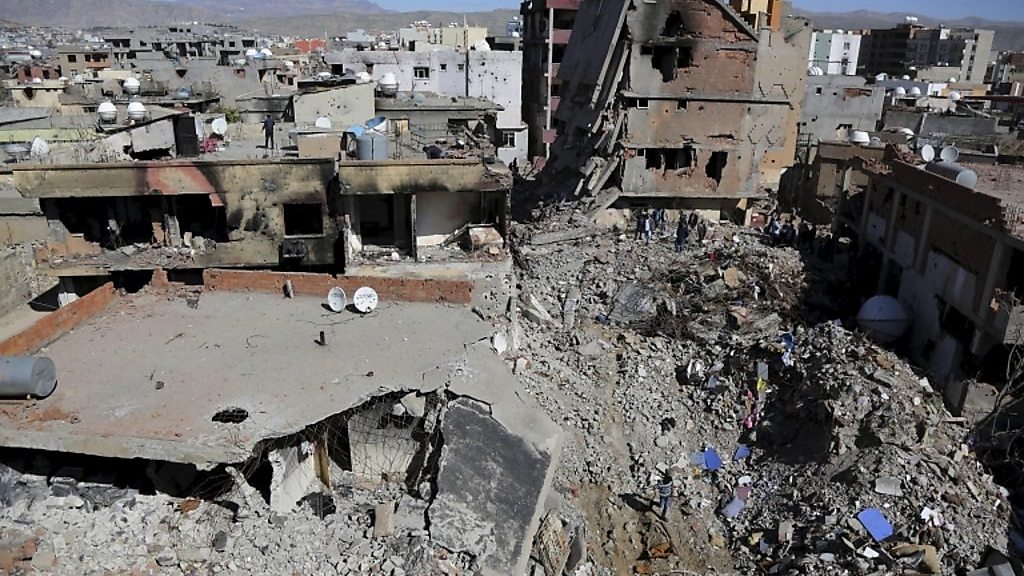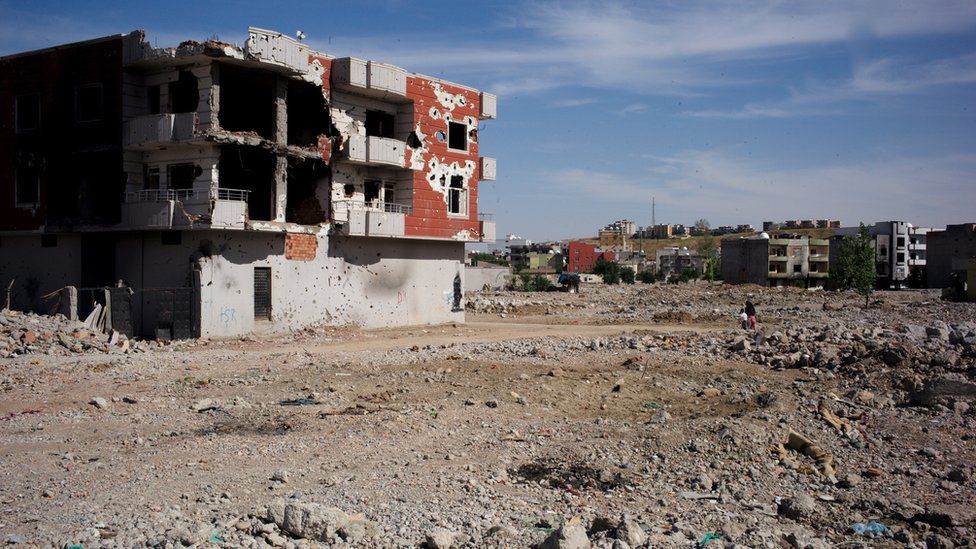RIC’s newest periodic report, appearing once every quarter, tracks human rights violations and crimes by Turkey and Turkish-backed SNA groups in the occupied regions of Afrin and the ‘M4 Strip’ – the border region between the occupied cities of Sere Kaniye and Tel Abyad. The RIC team:
Kurdish fighters who died during the clashes with the Turkish Army are buried in the cemetery of the unknown without their families being informed
Afrin violations: Imam fired from job for criticizing Turkish-backed factions’ looting and blackmail
Aleppo Province – Syrian Observatory for Human Rights: SOHR activists reported that armed members of the Turkish-backed faction “Ahfad Al-Rasul” that is in control of Ba’danli village of Raju township in the countryside of Afrin city, discharged the Imam of the village’s mosque.
ARK News: A Human Rights Organization working to document violations in the Kurdish region of Afrin reported on its main page of Facebook today, 14.02.2020, that armed members of the Turkish-backed faction “Ahfad Al-Rasul” that is in control of Badina village of Rajo township in the countryside of Afrin city, discharged the Imam of the village’s mosque.
BEIRUT (AP) — The Syrian fighters vowed to kill “pigs” and “infidels,” paraded their Kurdish captives in front of cameras and, in one graphic video, fired several rounds into a man lying on the side of a highway with his hands bound behind his back.
Turkish-backed Syrian rebels who seized the northern Syrian city of Afrin from a Kurdish militia on Sunday have been looting properties, reports say.
A UK-based monitoring group said shops and military and government facilities had been raided.
A rebel commander blamed “thieves” for the looting and said a unit had been set up to prevent further incidents.
The government of Turkey is accused of harvesting olives in Syria’s Afrin and selling them to the European Union (EU) countries.
In Switzerland, Conservative Democratic Party MP Bernhard Guhl has brought the topic into the parliamentary agenda, the Fox News reported.
According to the Olive Oil Times, Afrin Agricultural Council Deputy Chair Saleh Ibo said that Turkey has produced at least 5,000 tons of olive oil with the olives it took from Afrin area.
“They have also been confiscating the fields and olive groves of people who have had to flee Afrin due to the Turkish state violence in the months since the invasion,” Ibo added.
When Turkey launched a military offensive in northern Syria last January and called it Operation Olive Branch, many dismissed the name as part of a propaganda campaign.
Turkey said it wanted to rid the region of the Syrian Kurdish People’s Protection Units. It has long fought Kurdish insurgents at home and views the fighters in Syria as part of the banned Kurdistan Workers’ Party (PKK) in Turkey.
One year on, it appears the name of the operation has also taken on a more literal meaning.
(Beirut) – Turkey-backed armed groups in the Free Syrian Army (FSA) have seized, looted, and destroyed property of Kurdish civilians in the Afrin district of northern Syria, Human Rights Watch said today. The anti-government armed groups have installed fighters and their families in residents’ homes and destroyed and looted civilian properties without compensating the owners.
AFRIN, Syria (Reuters) – A day after Turkish troops and their Syrian rebel allies seized control of Afrin, a Turkish aid group started distributing relief supplies in the town center on Monday, but residents continued to leave after widespread reports of looting.
A court in Munich sentenced a German woman to 10 years in prison for the crime against humanity of letting a Yazidi child die of thirst in Mosul.
On 24 April 2021 Turkey launched another military invasion in northern Iraq, an area controlled by Kurds. The invasion, which is apparently still in progress, is reported to involve chemical attacks. The use of chemical weapons is a war crime and a breach of international law. Chemical weapons qualify as weapons of mass destruction.
According to international media reports, the invasion and the chemical attacks have forced Kurdish civilians to flee their villages. There is also a risk that civilians could be injured or killed. These attacks breach international law and bring to mind Turkey’s invasion of northern Syria, which led to an occupation.
Iraq had not given Turkey authorisation for its troops to enter the country. Iraq’s foreign minister, Fuad Hussein, has said that Turkish forces entered the country illegally, in violation of Iraq’s sovereignty.
In the light of the foregoing, I should like to ask the European External Action Service (EEAS) the following questions:
1. Is the EEAS aware of these reports?
2. Is the EEAS intending to condemn Turkey’s military invasion of northern Iraq and use of chemical weapons, and will the EEAS be taking further action against Turkey bilaterally and within the EU?
3. How is the EEAS intending to counter Turkey’s attack on Kurdish parts of Iraq?
DEMONSTRATIONS took place outside the United Nations and the Organisation for the Prohibition of Chemical Weapons (OPCW) today, demanding action against Turkey over its five-month bombing of Iraqi Kurdistan.
Ankara is accused of using chemical weapons during the military operations, which have been condemned as a breach of international law and of Iraq’s national sovereignty.
Speaking at a rally outside the UN offices in Geneva, Democratic Kurdish Community Centre co-chair Berivan Avci implored the international community to stop turning a blind eye to Turkish war crimes.
Footage sent exclusively to the Morning Star purported to show the aftermath of a chemical attack, which officials said took place in the Avashin region of the mountainous Duhok province on May 3.
German Left Party, MP, Gökay Akbulut said the German government should cancel all agreements with the Turkish state that uses banned chemical weapons against the Kurdish people, adding that “countries that supply weapons to the Turkish state are complicit in genocidal attacks.”
Salih Kado said that the occupying powers of Kurdistan agree to exterminate the Kurds because their economic and political interests are intertwined. He stressed that Turkey’s use of chemical weapons is part of the failed policy and a reaction to the defeat.
Secretary-General of the Syrian Kurdish Left Party, Saleh Kado
ERBIL (Kurdistan 24) – According to a report released earlier this week by a human rights organization, at least 877 civilians throughout 2020 were arrested by Turkish-backed militias and Turkish intelligence in the Afrin region of northern Syria.
This comes despite promises by the Syrian opposition to investigate and stop abuses by Turkish-backed groups in areas occupied by Turkey and its proxy militias, such as Afrin, Tal Abyad, and Ras al-Ain (Serekaniye).
- Efrin (Afrin)
- Kidnappings & Abductions
- Missing Women of Afrin
- Rojava (Kurdish region in Syria)
- Serê Kaniyê (Ras al-Ayn) (Rojava (Kurdish region in Syria))
- Tal Abyad (Rojava, Kurdish Region in Syria)
- Turkey’s proxy militias
- Turkish-backed Syrian National Army (SNA)
- United Nations’ Independent International Commission of Inquiry on Syria
- War Crimes
- War Crimes (Turkey)
ERBIL (Kurdistan 24) – A new report issued on Tuesday by the United Nations’ Independent International Commission of Inquiry on Syria suggests that Turkish-backed groups in the embattled Middle Eastern nation have “committed torture, cruel treatment and outrages upon personal dignity, including rape and other forms of sexual violence, which constitute war crimes.”
It stated that the Turkish-supported Syrian National Army (SNA) continues to unlawfully arrest Kurdish citizens in areas under their control in northern Syria such as in Tal Abyad, Afrin, and Ras al-Ain (Serekaniye).
This report documents the arrests of 21 persons, one of whom died under torture, in Ras al-Ayn/Serê Kaniyê and Tal Abyad, as well as the arrest of 31 people, including women and children, in Afrin
The human rights organization “STJ registered the release of only 7 detainees, while the remaining 45 continue to be unaccounted for, including the women and children.”
TURKISH war planes have bombed a Kurdish village in Iraqi Kurdistan with chemical weapons, local officials told the Morning Star, demanding that war-crime investigations be opened.
Refugees accuse soldiers of ethnic cleansing as some 200,000 displaced
UN report is based on 538 witness interviews, documents, satellite imagery, photographs and videos relating to events away from the major battle zones during the first half of this year, Peter Stubley writes
On September 11, 2020, two Kurdish farmers, Servet Turgut and Osman Şiban, were thrown from a Turkish military helicopter in the southeastern province of Van, Turkey. Turgut died from his injuries on September 30th, and Turkish authorities implausibly claimed that he’d fallen from a high rock formation while trying to escape arrest by the Turkish Jandarma.
This edited volume, comprising chapters by leading academics and experts, aims to clarify the complexity of Turkey’s Kurdish question. The Kurdish question is a long-standing, protracted issue, which gained regional and international significance largely in the last thirty years. The Kurdish people who represent the largest ethnic minority in the Middle East without a state have demanded autonomy and recognition since the post-World I wave of self-governance in the region, and their nationalist claims have further intensified since the end of the Cold War. The present volume first describes the evolution of Kurdish nationalism, its genesis during the late nineteenth century in the Ottoman Empire, and its legacy into the new Turkish republic. Second, the volume takes up the violent legacy of Kurdish nationalism and analyzes the conflict through the actions of the PKK, the militant pro-Kurdish organization which grew to be the most important actor in the process. Third, the volume deals with the international dimensions of the Kurdish question, as manifested in Turkey’s evolving relationships with Syria, Iraq, and Iran, the issue regarding the status of the Kurdish minorities in these countries, and the debate over the Kurdish problem in Western capitals.
Human Rights Watch conducts regular, systematic investigations of human rights abuses in some seventy countries around the world. It addresses the human rights practices of governments of all political stripes, of all geopolitical alignments, and of all ethnic and religious persuasions. In internal wars it documents violations by both governments and rebel groups. Human Rights Watch defends freedom of thought and expression, due process and equal protection of the law; it documents and denounces murders, disappearances, torture, arbitrary imprisonment, exile, censorship and other abuses of internationally recognized human rights.
Human Rights Watch began in 1978 with the founding of its Helsinki division. Today, it includes five divisions covering Africa, the Americas, Asia, the Middle East, as well as the signatories of the Helsinki accords. It also includes five collaborative projects on arms transfers, children’s rights, free expression, prison conditions, and women’s rights. It maintains offices in New York, Washington, Los Angeles, London, Brussels, Moscow, Dushanbe, Rio de Janeiro, and Hong Kong. Human Rights Watch is an independent, nongovernmental organization, supported by contributions from private individuals and foundations worldwide. It accepts no government funds, directly or indirectly.
The staff includes Kenneth Roth, executive director; Cynthia Brown, program director; Holly J. Burkhalter, advocacy director; Robert Kimzey, publications director; Jeri Laber, special advisor; Gara LaMarche, associate director; Lotte Leicht, Brussels office director; Juan Méndez, general counsel; Susan Osnos, communications director; Jemera Rone, counsel; Joanna Weschler, United Nations representative; and Derrick Wong, finance and administration director.
The regional directors of Human Rights Watch are Peter Takirambudde, Africa; José Miguel Vivanco, Americas; Sidney Jones, Asia; Holly Cartner, Helsinki; and Christopher E. George, Middle East. The project directors are Joost R. Hiltermann, Arms Project; Lois Whitman, Children’s Rights Project; Gara LaMarche, Free Expression Project; and Dorothy Q. Thomas, Women’s Rights Project.
The members of the board of directors are Robert L. Bernstein, chair; Adrian W. DeWind, vice chair; Roland Algrant, Lisa Anderson, Peter D. Bell, Alice L. Brown, William Carmichael, Dorothy Cullman, Irene Diamond, Edith Everett, Jonathan Fanton, Jack Greenberg, Alice H. Henkin, Harold Hongju Koh, Jeh Johnson, Stephen L. Kass, Marina Pinto Kaufman, Alexander MacGregor, Josh Mailman, Andrew Nathan, Jane Olson, Peter Osnos, Kathleen Peratis, Bruce Rabb, Orville Schell, Sid Sheinberg, Gary G. Sick, Malcolm Smith, Nahid Toubia, Maureen White, and Rosalind C. Whitehead.
Kurdish civilians, including women, children and elderly residents, have been killed during security operations and armed clashes since July 2015 in southeastern Turkey. Local human rights groups have recorded well over 100 civilian deaths and multiple injuries. After unprecedented military deployments to the region in recent days, several cities are under curfew and some of their neighborhoods the scenes of shelling by the military and heavy clashes with armed Kurdish groups. The civilian death toll is likely to rise steeply in the coming days.
ISTANBUL – U.S.-based Human Rights Watch has accused Ankara of blocking international scrutiny over what it calls widespread human rights violations by Turkish security forces in its crackdown on Kurdish rebels.
The Human Rights Watch report focused on fighting between Turkish security forces and Kurdish rebels in Cizre. The town is a center of Kurdish nationalism that has witnessed some of the most intense fighting since last year’s collapse of a peace process with the Kurdish rebel group the PKK.
Human Rights Watch report author Emma Sinclair Webb alleges security forces are covering up abuses.
“There are a huge number of civilians who have been killed during security operations. And there is almost no sign of an investigation into these deaths, and there is an attempt to cover up. We were prevented from visiting families who had lost relatives during the security operations,” she said.
The United Nations wants to send investigators to examine allegations that Turkish forces massacred around 100 civilians in the Kurdish town of Cizre.
It relates to an operation carried out against the PKK, armed Kurdish separatists classified by the EU and the US as terrorists.
Serious allegations have been made about the deaths of civilians at the hands of Turkish security forces in the overwhelmingly Kurdish town of Cizre in south-eastern Turkey earlier this year.
Local people say Turkish security forces killed up to 160 civilians in the town, according to statements made to the BBC and human rights groups.
The worst single incident ended with the deaths of around 100 people who had been sheltering in three cellars.
The UN human rights chief has expressed his concern in unusually strong terms and wants to send in investigators.
Turkish military forces and a coalition of Turkey-backed Syrian armed groups have displayed a shameful disregard for civilian life, carrying out serious violations and war crimes, including summary killings and unlawful attacks that have killed and injured civilians, during the offensive into northeast Syria, said Amnesty International today.
The organization gathered witness testimony between 12 and 16 October from 17 people including medical and rescue workers, displaced civilians, journalists, local and international humanitarian workers, as well as analyzing and verifying video footage and reviewing medical reports and other documentation.
Two and a half years after Turkey and its jihadist allies invaded the predominantly Kurdish region of Afrin in northwestern Syria, excessive violence, looting and expulsions continue to occur in the formerly self-governing canton. There are almost daily reports of kidnappings, arbitrary arrests, torture, rape and murder in the occupied territories. The cases are increasing from month to month and are becoming more and more brutal as the activities of the jihadists become part of everyday life. Numerous brutal crimes were also reported in August this year.. Below, the crimes such as murder and kidnapping are documented from the month of August. In addition, figures are given for crimes such as death, torture, abduction and rape from the occupation of Afrin in May 2018 to the present day. As there is no access to the occupied territories for independent human rights observers and organizations (after the occupation of Afrin in 2018, Sere Kaniye and Gire Spi were occupied in October 2019), access to information on human rights violations is very difficult. Human rights organizations and activists conduct research in the strictest secrecy in order to protect the population remaining in Afrin. The cases documented here are those that come to light with the help of these organizations and activists. The number of unreported cases of human rights violations is most likely much higher.
“For over a year, the Turkish army has illegally occupied the city and region of Afrin. This has particularly impacted the women of the region, with rape, kidnapping and gendered violence systematically used as weapons. The Turkish army and the jihadist militias they fund and support work together in these aims, and have forcibly imposed Sharia law on women of all different beliefs.” Kongra Star
In 2018 Turkish armed forces invaded and took control of the northern Syrian region of Afrin, which was largely populated by Kurds, Yazidis, Christians, and other minority groups. The Turks and their allied militias drove hundreds of thousands of people out of Afrin, many of whom sought refuge in northeastern Syria, governed by the Autonomous Administration of North and East Syria (AANE). At the end of 2019, Turkey also invaded northeastern Syria after President Trump ordered most US forces out of Syria.

